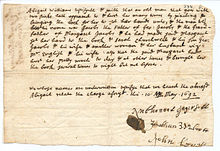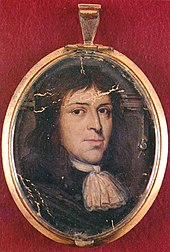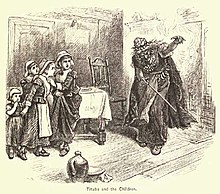Abigail Williams
Abigail Williams (* July 12, 1680 ; † ≈1699) was a girl whose behavior sparked the Salem witch trials in 1692.
Life
Abigail Williams lost her parents in a clash with Indians. She lived in the house of her uncle, the revival preacher Samuel Parris , who was from London. After studying at Harvard , he inherited a sugar cane plantation in Barbados after the death of his father . In Barbados he bought the Caribbean slave Tituba. After a hurricane destroyed his plantation in 1680, he sold some land and returned to Boston, taking Tituba with him. He married Elizabeth Eldridge, with whom he had three children named Thomas, Elizabeth "Betty" (1682-1760) and Susannah. The income from his trade and the plantation was not enough and he looked around for a pastorate. In 1689 he became pastor of the strictly puritanical community of Salem . The focus of his sermons was on the battle between God's chosen people and Satan. There was a dispute between Parris and his community over whether his salary should be paid. This tension led, among other things, to the witch hunt.
In the winter of 1691/1692 Abigail Williams and Betty Parris began to behave conspicuously. According to the Reverend Deodat Lawson, Parris' predecessor in office, the two children had seizures in which they ran around rooms, flailing their arms, ducking under chairs, trying to climb the fireplace, talking strangely, and twisting their bodies unnaturally. Abigail was accused by the neighbors to her cousin jinx . The doctor William Griggs, after a thorough examination and the ruling out of all mental disorders known at the time, diagnosed obsession. The girls would be twisted by the invisible hand of the devil. Abigail and Elisabeth confirmed this and described how they were tormented by invisible hands.
It is possible that there was an ergot poisoning that the children ingested during their voodoo games in which Tituba was involved.
Witch trial
Parris took up the suspicion of witchcraft and said that the city had been occupied by Satan. An army of little devils are ready to invade the settlement. Elizabeth reported that Satan had tried to approach her. Since she had rejected him, he now sends his henchmen, the witches.
To ward off Satan's attack, the witches should be identified and named. Betty and Abigail were pressured to reveal the names of people who had bewitched the girls. They initially blamed Sarah Good, Sarah Osborne and Tituba. Sarah Good was a well-known beggar woman, daughter of a French innkeeper; she was said to have talked to herself frequently. Sarah Osborne was a bedridden elderly woman who is believed to have robbed her first husband's children of their inheritance by giving it to their new husband. Tituba reported about meetings of witches and claimed to have seen some names in the book of Satan.
On February 29, 1692, the three women were arrested for witchcraft. All three of them were found guilty, with only Tituba confessing to witchcraft. Sarah Good was hanged and Sarah Osborne died in prison, as did Sarah Good's newborn baby. Tituba was released from prison a year later after an unknown person paid the necessary fees. 150 people were charged in the course of the witch hunt in Salem.
After the witch trials ended, Abigail ran away from Salem and her uncle's house.
effect
Abigail Williams is the main character in Arthur Miller's play Witch Hunt from 1953. The drama is based on the incidents in 1692. Although the play is based on the witch trials, it is historically incorrect, Williams is around 17 years old and has one Affair with John Proctor, but the real Abigail was a child and lived more than 11 miles from the Proctors Farm.
In the 1956 children's book Tituba of Salem Village by Ann Petry , Abigail Williams appears. She is also featured in the novel by Maryse Condé I, Tituba, the Black Witch of Salem. (1986, English Tituba: Black Witch of Salem. ISBN 978-3426080740 ).
The film Die Hexen von Salem (French Les sorcières de Salem ), a Belgian-East German co-production from 1957, is based on the play witch hunt by Arthur Miller. The script was written by Jean-Paul Sartre . Abigail Williams is portrayed by Mylène Demongeot . In the 1996 film The Witch Hunt , also based on the play by Arthur Miller, Winona Ryder plays the main character, Abigail Williams. In the American fantasy adventure film Duell der Magier (2010, original title The Sorcerer's Apprentice) Nicole Ehinger appears as Abigail Williams in a small supporting role.
A metal band (death metal and black metal) that was founded in Phoenix (Arizona) in 2004 is called Abigail Williams .
In the game Murdered: Soul Suspect Williams is portrayed as a ghost girl from the Puritan days; you will find out more about them later in the game.
Web links
- Biography of Abigail Williams ( Memento from August 28, 2006 in the Internet Archive )
Individual evidence
- ^ Larry Gragg: A Quest for Security , pp. 1-2. Retrieved November 9, 2011.
- ^ Larry Gragg: A Quest for Security , pp. 14-32. Retrieved November 9, 2011.
- ↑ Starkey Marion L: The Devil in Massachusetts , pp. 26-28. Retrieved November 9, 2011.
- ↑ Boyer and Stephen Nissenbaum, Salem Possessed: The Social Origins of Witchcraft . Cambridge: Harvard University Press, 1974. Print. (Pp. 2-3).
- ^ Ergotism: The Satan Loosed in Salem? ( Page no longer available , search in web archives ) Info: The link was automatically marked as defective. Please check the link according to the instructions and then remove this notice. (PDF; 1.3 MB) - Linnda R. Caporael, Science. vol. 192, April 1976.
- ^ Rube Blix Hagen: Dei europeiske trolldomsprosessane. Oslo 2007, ISBN 978-82-521-7016-0 , pp. 70-80. P. 72.
- ↑ Elaine G Breslaw: Reluctant Witch of Salem: Devilish Indians and Puritan Fantasies. University Press, New York 1996.
- ^ Veta Smith Tucker: Purloined Identity: The Racial Metamorphosis of Tituba of Salem Village. Journal of Black Studies, (March 2000)
- ↑ Boyer and Stephen Nissenbaum: Salem Possessed: The Social Origins of Witchcraft. Harvard University Press, Cambridge 1974. Print. (P. 3).
- ^ Games, Alison. Witchcraft in Early North America. Rowman & Littlefield Publishers, Inc., Plymouth 2010. Print. (P. 176).
| personal data | |
|---|---|
| SURNAME | Williams, Abigail |
| BRIEF DESCRIPTION | American woman who played a role in the Salem, Massachusetts witch trials |
| DATE OF BIRTH | July 12, 1680 |
| DATE OF DEATH | 17th century or 18th century |


